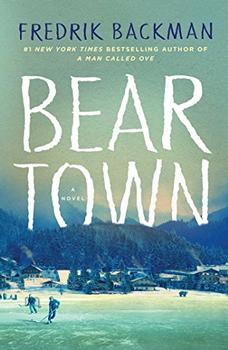Summary | Excerpt | Reading Guide | Reviews | Beyond the Book | Readalikes | Genres & Themes | Author Bio

To answer that question you need to walk a few hundred yards down toward the lake. The building you see there doesn't look like much, but it's an ice rink, built by factory workers four generations ago, men who worked six days a week and needed something to look forward to on the seventh. All the love this town could thaw out was passed down and still seems to end up devoted to the game: ice and boards, red and blue lines, sticks and pucks and every ounce of determination and power in young bodies hurtling at full speed into the corners in the hunt for those pucks. The stands are packed every weekend, year after year, even though the team's achievements have collapsed in line with the town's economy. And perhaps that's why—because everyone hopes that when the team's fortunes improve again, the rest of the town will get pulled up with it.
Which is why places like this always have to pin their hopes for the future on young people. They're the only ones who don't remember that things actually used to be better. That can be a blessing. So they've coached their junior team with the same values their forebears used to construct their community: work hard, take the knocks, don't complain, keep your mouth shut, and show the bastards in the big cities where we're from. There's not much worthy of note around here. But anyone who's been here knows that it's a hockey town.
Bang.
Amat will soon turn sixteen. His room is so tiny that if it had been in a larger apartment in a well-to-do neighborhood in a big city, it would barely have registered as a closet. The walls are completely covered with posters of NHL players, with two exceptions. One is a photograph of himself aged seven, wearing gloves that are too big for him and with his helmet halfway down his forehead, the smallest of all the boys on the ice. The other is a sheet of white paper on which his mother has written parts of a prayer. When Amat was born, she lay with him on her chest in a narrow bed in a little hospital on the other side of the planet, no one but them in the whole world. A nurse had whispered the prayer in his mother's ear back then—it is said to have been written on the wall above Mother Teresa's bed—and the nurse hoped it would give the solitary woman strength and hope. Almost sixteen years later, the scrap of paper is still hanging on her son's wall, the words mixed up, but she wrote them down as well as she could remember them:
If you are honest, people may deceive you. Be honest anyway.
If you are kind, people may accuse you of selfishness. Be kind anyway.
All the good you do today will be forgotten by others tomorrow. Do good anyway.
Amat sleeps with his skates by his bed every night. "Must have been one hell of a birth for your poor mother, you being born with those on," the caretaker at the rink often jokes. He's offered to let the boy keep them in a locker in the team's storeroom, but Amat likes carrying them there and back. Wants to keep them close.
Amat has never been as tall as the other players, has never been as muscular as them, has never shot as hard. But no one in the town can catch him. No one on any team he's encountered so far has been as fast as him. He can't explain it; he assumes it's a bit like when people look at a violin and some of them just see a load of wood and screws where others see music. Skates have never felt odd to him. On the contrary, when he sticks his feet in a pair of normal shoes he feels like a sailor stepping ashore.
The final lines his mother wrote on the sheet of paper on his wall read as follows:
What you create, others can destroy. Create anyway. Because in the end, it is between you and God. It was never between you and anyone else anyway.
Immediately below that, written in red crayon in the determined handwriting of a primary school student, it says:
Excerpted from Beartown by Fredrik Backman. Copyright © 2017 by Fredrik Backman. Excerpted by permission of Atria Books. All rights reserved. No part of this excerpt may be reproduced or reprinted without permission in writing from the publisher.
Your guide toexceptional books
BookBrowse seeks out and recommends the best in contemporary fiction and nonfiction—books that not only engage and entertain but also deepen our understanding of ourselves and the world around us.